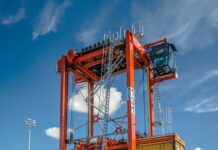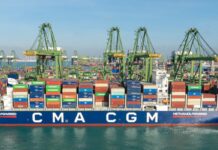
Given the recent public debate around container shipping in the Arctic, MSC Mediterranean Shipping Company has doubled down on its position to avoid considering the Northern Sea Route, including the Northeast and Northwest Passages, on environmental grounds.
An expansion of Arctic shipping could increase the emissions of so-called black carbon – physical particles of unburned carbon that can settle on land or ice and compromise air quality and accelerate the shrinkage of Arctic sea ice. Risks such as navigation incidents, fuel spills, air quality and altering the ecological balance/biodiversity of the marine habitat beneath the surface of the sea also outweigh any commercial opportunities to make a short cut between North America or Europe and eastern Russia or Asia.
“As a responsible company, this was an obvious decision for us,” commented MSC CEO Soren Toft. “MSC will not seek to cut through the melting ice of the Arctic to find a new route for commercial shipping, and I consider this a position the whole shipping industry must adopt. Some of our peers have already made the same commitment to putting the preservation of the Arctic environment ahead of profits. The Northern Sea Route is neither a quick fix for the current market challenges nor a viable long-term strategy.”
MSC first made this Arctic commitment in 2019. The company is also a leader in improving container shipping energy efficiency by deploying almost 24,000 TEU vessels in the sector’s largest fleet investment programme and is actively exploring a range of new fuels and technologies to achieve a zero-carbon future and help mitigate climate change in the process.
Minimising and subsequently reducing CO2 emissions is a key pillar of the company’s approach to investing in sustainability. MSC also understands that a reduction in black carbon would not only help tackle climate change but could also have benefits for human health. MSC believes that these concerns should not be overlooked amid the current debate over the impact of the COVID pandemic and Suez Canal disruption on supply chains and regards Arctic route exploitation as an unwarranted step in the wrong direction.
“Attempting to open new navigation routes which skim the polar ice cap sounds like the ignorant ambition of an 18th-century explorer when today we know that this would pose further risks to humans and many other species in that region, as well as worsen the impact of shipping upon climate change,” said Bud Darr, Executive Vice President Maritime Policy & Government Affairs at MSC Group.
“MSC supports the decarbonisation targets of the UN International Maritime Organization, including complete decarbonisation of shipping, and sees no overall merit in using this potential trade route. The risks and impacts outweigh the benefits of the shorter transits. There are no shortcuts toward genuine decarbonisation of shipping, and this is a shortcut that we should definitely avoid.”
อัพเดตข่าวสารและบทความที่น่าสนใจในอุตสาหกรรมโลจิสติกส์ก่อนใคร ผ่าน Line Official Account @Logistics Mananger เพียงเพิ่มเราเป็นเพื่อน @Logistics Manager หรือคลิกที่นี่














